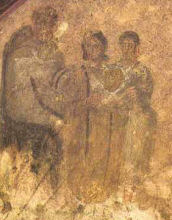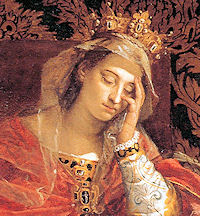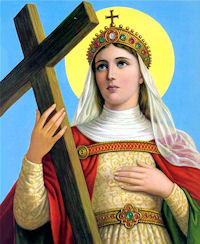Ordinary Time: August 18th
Thursday of the Twentieth Week in Ordinary Time
Other Commemorations: St. Agapitus, Martyr (RM); St. Helena, Widow (RM)
» Enjoy our Liturgical Seasons series of e-books!
Gospel Verse, Ps 95:8:
If today you hear his voice, harden not your hearts.
Today in the Roman Martyrology is the commemoration of St. Agapitus (d. 259), a martyr of Palestrina, not far from Rome. His cult, which is very ancient, was particularly popular in the eternal city where Felix III (492) caused a church to be built in his honor. Ancient inscriptions show clearly the great confidence placed in the intercession of this martyr.
It is also the commemoration of St. Helena (248-328), empress, and mother of Constantine the Great. She discovered the True Cross in a rock-cistern near Mount Calvary.
St. Agapitus
 The Office offers these legendary details: "Agapitus was only fifteen years old but already his heart was all aglow with the desire to die as a martyr. Upon orders from the Emperor Aurelian (ca. 257), he was mercilessly whipped with leaded scourges, then thrown into a vile basement to remain there four days without food. After further punishment under the lash, he was suspended head downwards over a smoldering fire so that he should die from the smoke; boiling water was dashed against him, and his jaws were battered. When wild beasts hesitated to harm him, he was beheaded with the sword."
The Office offers these legendary details: "Agapitus was only fifteen years old but already his heart was all aglow with the desire to die as a martyr. Upon orders from the Emperor Aurelian (ca. 257), he was mercilessly whipped with leaded scourges, then thrown into a vile basement to remain there four days without food. After further punishment under the lash, he was suspended head downwards over a smoldering fire so that he should die from the smoke; boiling water was dashed against him, and his jaws were battered. When wild beasts hesitated to harm him, he was beheaded with the sword."
—Excerpted from The Church's Year of Grace, Pius Parsch
Palestrina, the ancient Preneste, sends a representative to Mary’s court today, in the person of its valiant and gentle martyr, Agapitus. By his youth and his fidelity, he reminds us of that other gracious athlete, the acolyte Tarcisius, whose victory, gained on the 15th August, is eclipsed by the glory of Mary’s queenly triumph. During the persecution of Valerian, and just before the combats of Sixtus and Laurence, Tarcisius, carrying the Body of our Lord, was met by some pagans, who tried to force him to show them what he had; but, pressing the heavenly treasure to his heart, he suffered himself to be crushed beneath their blows rather than “deliver up to mad dogs the members of the Lord.” Agapitus, at fifteen years of age, suffered cruel tortures under Aurelian. Though so young, he may have seen the disgraceful end of Valerian; while the new edict, which enabled him to follow Tarcisius to Mary’s feet, had scarcely been promulgated throughout the empire, when Aurelian, in his turn, was cast down by Christ, from whom alone kings and emperors hold their crown.
—Excerpted from The Liturgical Year, Dom Prosper Gueranger, OSB
Patronage: against colic; Palestrina, Italy
Symbols and Representation: young man chained in a dungeon; young man hanging upside down over a fire; young man with palm, crown, burning coal, lions or dragons
Highlights and Things to Do:
- A boy of fifteen years a full-fledged hero! Has he any lesson for modern youth? Of you Christ is not demanding such suffering, neither blood nor death. But He is demanding a will that can say NO to the allurements of sin, a will that can bend itself humbly in obedience. In this you have opportunity to be a youthful hero.
- Find out more about Agapitus:
- A reliquary in the Pfarrkirche St. Nikolaus in Tirol, Austria, contains relics believed to be of St. Agapitus.
- See an image of the statue of Martyrdom of St. Agapitus by Marco Antonio Prestinari.
- See other images of Agapitus.
St. Helena of the Cross
 It was the pious boast of the city of Colchester, England, for many ages, that St. Helena was born within its walls; and though this honor has been disputed, it is certain that she was a British princess. She embraced Christianity late in life; but her incomparable faith and piety greatly influenced her son Constantine, the first Christian emperor, and served to kindle a holy zeal in the hearts of the Roman people. Forgetful of her high dignity, she delighted to assist at the Divine Office amid the poor; and by her alms-deeds showed herself a mother to the indigent and distressed.
It was the pious boast of the city of Colchester, England, for many ages, that St. Helena was born within its walls; and though this honor has been disputed, it is certain that she was a British princess. She embraced Christianity late in life; but her incomparable faith and piety greatly influenced her son Constantine, the first Christian emperor, and served to kindle a holy zeal in the hearts of the Roman people. Forgetful of her high dignity, she delighted to assist at the Divine Office amid the poor; and by her alms-deeds showed herself a mother to the indigent and distressed.
In her eightieth year she made a pilgrimage to Jerusalem, with the ardent desire of discovering the cross on which our blessed Redeemer suffered. After many labors, three crosses were found on Mount Calvary, together with the nails and the inscription recorded by the Evangelists. It still remained to identify the true cross of Our Lord. By the advice of the bishop, Macarius, the three were applied successively to a woman afflicted with an incurable disease, and no sooner had the third touched her than she arose, perfectly healed. The pious empress, transported with joy, built a, most glorious church on Mount Calvary to receive the precious relic, sending portions of it to Rome and Constantinople, where they were solemnly exposed to the adoration of the faithful.
In the year 312 Constantine found himself attacked by Maxentius with vastly superior forces, and the very existence of his empire threatened. In this crisis he bethought him of the crucified Christian God Whom his mother Helena worshiped, and kneeling down, prayed God to reveal Himself and give him the victory. Suddenly, at noonday, a cross of fire was seen by his army in the calm and cloudless sky, and beneath it the words, In hoc signo vinces—"Through this sign thou shalt conquer." By divine command, Constantine made a standard like the cross he had seen, which was borne at the head of his troops; and under this Christian ensign they marched against the enemy, and obtained a complete victory. Shortly after, Helena herself returned to Rome, where she expired, 328.
—Excerpted from Butler's Lives of the Saints
Symbols and Representation: cross; cross in hand; queen holding a cross; woman receiving the location of the True Cross in a dream; queen leading the search for the True Cross; queen giving a letter to a messenger; woman with a book and small cross; nails; woman with cross and nails; woman with Constantine
Patronage: against fire; against storms; against thunder; archeologists; converts; difficult marriages; divorced; cloth dyers; empresses; diocese of Helena, Montana; nail smiths; needle makers
Highlights and Things to Do:
- Find out more about St. Helen:
- The Golden Legend
- Catholic Ireland, Mother of Constantine
- Catholic Ireland: In Search of the Cross
- For children: Queen and the Cross by Cornelia Bilinsky
- For children: Noble Lady: The Life of St. Helen by the Daughters of St. Paul
- For children: Helena and the True Cross by Louis de Wohl (Vision Book)
- Helena by Evelyn Waugh
- The Living Wood: A Novel about Saint Helena and the Emperor Constantine by Louis de Wohl






